- Home
- Technical Cooperation Projects
- Index of Countries
- Asia
- Philippines
- Creation of Non-Handicapping Environment for Persons with Disabilities in the Rural Areas
- Project Activities
- 3-10. 2nd Training on Strengthening of Self-help Groups/Organizations (SHGs/SHOs) of Persons with Disabilities (PWDs)
3-10. 2nd Training on Strengthening of Self-help Groups/Organizations (SHGs/SHOs) of Persons with Disabilities (PWDs)
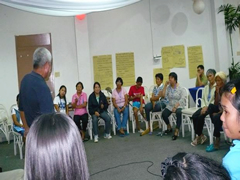 Resource person shared examples on the participatory project planning and management for Opol participants.
Resource person shared examples on the participatory project planning and management for Opol participants.
The Training on Strengthening of Self-Help Groups/Self-Help Organizations (SHGs/SHOs) for Persons with Disabilities in Opol, Misamis Oriental was held last March 4 to 6, 2011 at the Harbor Lights Hotel in Cagayan De Oro. There were twenty four (24) trainees consisting of sixteen (16) Persons with Disabilities (PWDs) and eight (8) Parents of PWDs. This is the 2nd training on Strengthening of SHGs/SHOs of PWDs for Opol Municipality. The same training was also given to New Lucena Municipality last March 11 to 13, 2011 at the Iloilo Grand Hotel, with twenty four (24) participants consisting of twenty (20) PWDs and four (4) Parents of PWDs.
The seminar workshop on Community Organizing enabled the participants to enhance their knowledge, attitudes and skills in building/strengthening SHGs/SHOs of PWDs. The training also deepened the participants' appreciation of their situation and their capabilities as main actors in building a Non-Handicapping Environment (NHE) for PWDs. The participants were able to assess their organizational action plans to consolidate and expand at the barangay and municipal levels. Several action plans were also developed. The plans target on increasing their confidence through collective strength and capabilities, such as plans on livelihood project and activities to promote NHE.
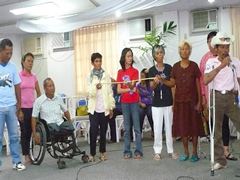 Participants from Opol presented 10 points on successful project implementation
Participants from Opol presented 10 points on successful project implementation
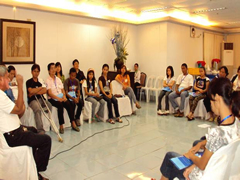 Participants in New Lucena listened to the resource person as he shared some key points of participatory project development and management.
Participants in New Lucena listened to the resource person as he shared some key points of participatory project development and management.
Contents of the Training: Participatory Project Planning, Management, Monitoring and Evaluation
Resource Person: Dr. Angelito Manalili, Professor and Former Dean of College of Social Work and Community Development (CSWCD), University of the Philippines (UP), Diliman
Co-facilitator in Opol: Mr. Paul Edward Muego, CBR-CBM
Co-facilitator in New Lucena: Mr. Mario Abaygar, General Manager, ADPI-MPC
Training Objectives:
- To deepen the participants appreciation of the process of participatory project development and management;
- To identify common problems/issues in participatory project development and management;
- To enhance their skills in actual participatory project development and management; and
- To heighten their commitment to the continuing capacity development building, self-reliance and empowerment of PWDs.
Training Details:
Day 1: Community Organizing: Where are we now and where we want to go?
Objectives:
- To share experiences in strengthening organizations at the barangay and municipal levels; and
- To identify and plan concrete actions to continuously strengthen organizations
I. Sustaining Development Project/Initiatives of Persons with Disabilities.
Objectives:
- To examine the prevailing practices in planning and managing development projects; and
- To create an alternative model of project development and management which is based on participatory and people-centered.
II. Some Illustrative Cases
Objectives:
- To appreciate facilitative character of the role of community organizers;
- To discuss the innate talents and capabilities of the people to collectively plan and manage development projects; and
- To relate the case studies to their own participatory project development and management experiences.
Day 2: Workshop on Participatory Project Planning and Management
III. Workshop I, Situation Analysis: Towards a Participatory Project Identification
Objectives:
- To describe the situations of PWDs in the community;
- To List the potential project for the development of PWDs and building of NHE in the community; and
- To role play how the process is done together with the community people.
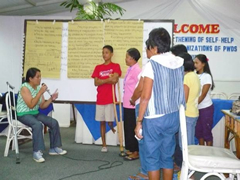 Opol Group 1: Participants did role-play about the PWDs and parents of PWDs in the school. In the play they discussed the problems of the PWDs with the school principal.
Opol Group 1: Participants did role-play about the PWDs and parents of PWDs in the school. In the play they discussed the problems of the PWDs with the school principal.
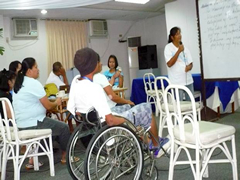 Opol Group 3: Participants did role-play about a wheelchair user in a small barangay who attended a meeting. In the play he (wheelchair user) came late because of the inaccessibility of the way/road to the meeting venue.
Opol Group 3: Participants did role-play about a wheelchair user in a small barangay who attended a meeting. In the play he (wheelchair user) came late because of the inaccessibility of the way/road to the meeting venue.
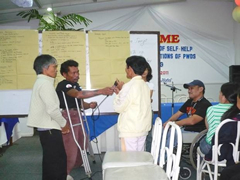 Opol Group 3: Participants did role-play about the visit to the house of a PWD and encouraged parents of the PWD to allow their son to participate in the association/federation of PWDs in their Barangay.
Opol Group 3: Participants did role-play about the visit to the house of a PWD and encouraged parents of the PWD to allow their son to participate in the association/federation of PWDs in their Barangay.
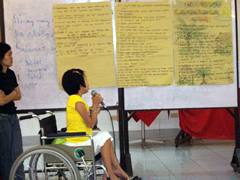 New Lucena: Ms. Grace Servas (center) presented their group output with Ms. Ckeesandra Solinap (left).
New Lucena: Ms. Grace Servas (center) presented their group output with Ms. Ckeesandra Solinap (left).
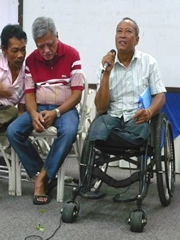 Opol: Mr. Puasan (right), a tribal leader from the Hinterland Barangay in Opol shared his experience on the participatory community development and management.
Opol: Mr. Puasan (right), a tribal leader from the Hinterland Barangay in Opol shared his experience on the participatory community development and management.
IV. Workshop II, Project Feasibility Study: Towards a Participatory Project Selection and Approval
Objectives:
- To list 100 questions which the answers can determine the viability/feasibility of a particular project; and
- To do role-play how the feasibility is realized together with the community people.
Day 3
V. Workshop III, Towards Sustaining Community Development Initiatives
Objectives:
- To share experiences in participatory project management;
- To share stories of their best practices in participatory project management; and
- To gather lessons from their experiences.
VI. Workshop IV, Participatory Project Monitoring and Evaluation: Learning and Innovating from Experiences
Objectives
- To share experiences in participatory project monitoring and evaluation;
- To share stories of best practices in participatory project monitoring and evaluation; and
- To gather lessons from their experiences.
Methodology:
The seminar-workshop was conducted in a participatory manner. The 1st training conducted in September 2010 was mainly guided by the resource person. While the 2nd Training was conducted through lectures and discussions, therefore participants were requested to have more responsibility on case analysis; small group discussions; plenary sessions, etc.
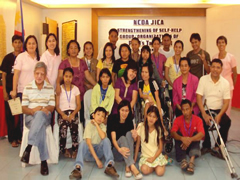
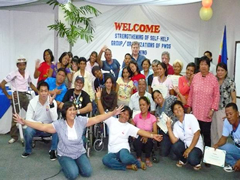 Participants and resource persons in New Lucena (left) and in Opol (right)
Participants and resource persons in New Lucena (left) and in Opol (right)
- About JICA
- News & Features
- Countries & Regions
- Our Work
- Thematic Issues
- Types of Assistance
- Partnerships with Other Development Partners
- Climate Change / Environmental and Social Considerations
- Evaluations
- Compliance and Anti-corruption
- Science and Technology Cooperation on Global Issues
- Research
- JICA Development Studies Program / JICA Chair
- Support for the Acceptance of Foreign HRs / Multicultural and Inclusive Community
- Publications
- Investor Relations
